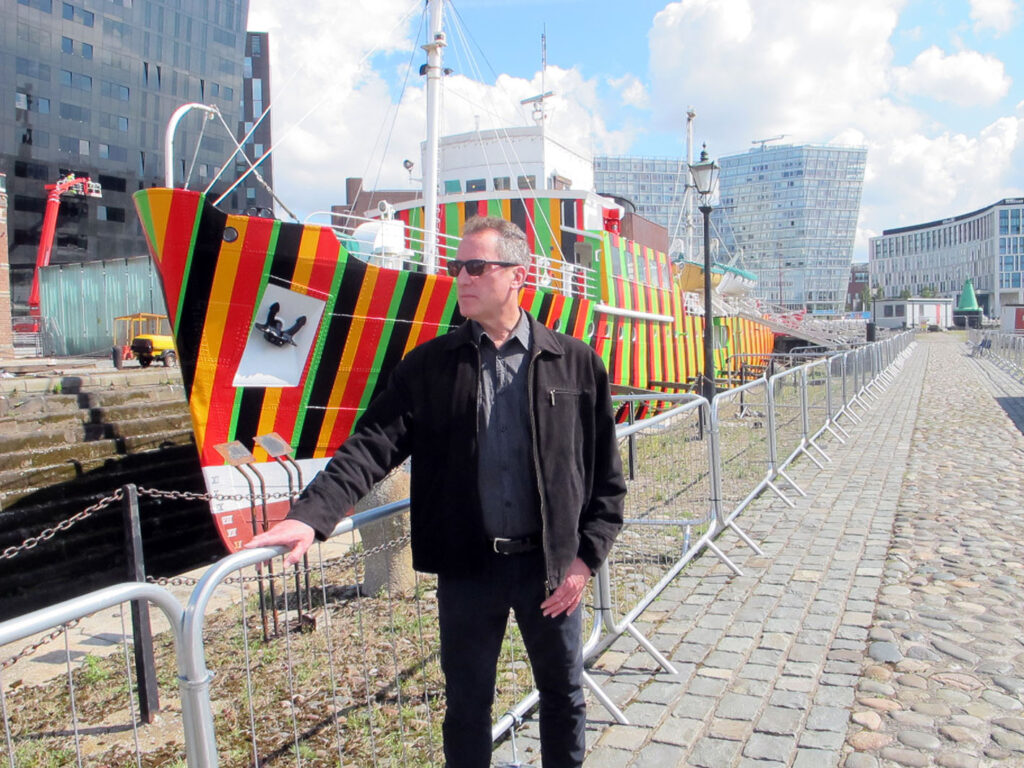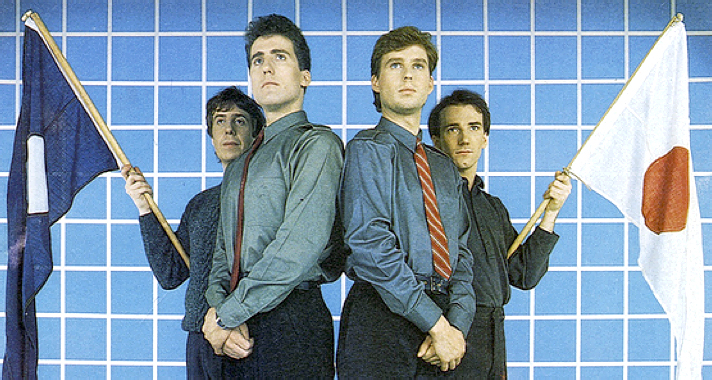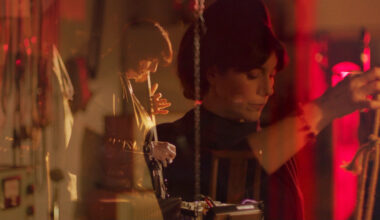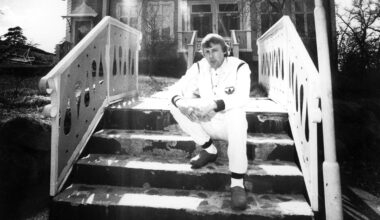Commercial failures, artistic triumphs and overdue celebrations… On the eve of two exclusive live shows, Andy McCluskey discusses ‘Dazzle Ships’, Orchestral Manoeuvres In The Dark’s often overlooked 1983 masterpiece
Andy McCluskey is excited. Even down a phone line, his enthusiasm is palpable. A mere 31 years after Orchestral Manoeuvres In The Dark’s fourth album, ‘Dazzle Ships’, famously succeeded in sinking 90 per cent of their audience – “As Virgin Records joked at the time, it shipped gold and returned platinum!” the Liverpudlian howls with laughter – OMD have sold out, within minutes, two special concerts inspired by the record at the Museum of Liverpool in early November.
But these won’t be boilerplate OMD gigs. They’ll see Andy McCluskey and his colleagues, Paul Humphreys and Martin Cooper, performing tracks from their once fated, now fêted release, including two that have never been played live before. In addition, they’ll be reunited with their original percussionist, a tape machine called Winston that’s normally stored behind glass in the Museum of Liverpool’s Wondrous Place gallery.
The shows are a powerful indication of how an album that was originally derided by critics and spurned by fans has been so dramatically reassessed that it’s become one of the most treasured in OMD’s catalogue. At the time, ‘Dazzle Ships’ sold 300,000 copies, which these days most bands would die for, but its predecessor, ‘Architecture And Morality’, had shifted three million. McCluskey refers to this striking drop in sales as “bloody painful”.
Nowadays, though, in a world of digital sampling, where “cut and paste” is an everyday expression, the methodology of ‘Dazzle Ships’ (inspired by musique concrète as much as Kraftwerk) seems significantly less alien. What was once considered either unseemly and jarring or just plain self-indulgent (at least for an act who’d become one of the most idiosyncratic pop bands of the 1980s), now seems gently accessible and no less thrilling than it once did to its few early fans. Listening to it today, you might even wonder what all the fuss was about.
“We’re accustomed to channel surfing, to multi-tasking with our computers, phones, radios, iPods and TVs,” McCluskey explains sagely. “We consume things in a much more multiplied and fractured way, and we’re accustomed to songs made of samples and broken bits of music reconstituted. So I think people find it easier to digest the album now.”
In fact, its popularity just keeps growing.
“It does seem to be taking on a life of its own,” McCluskey agrees. “The amount of discussion about it, and the reverence for it, you would think it was the biggest selling and the greatest album we ever made. It really is becoming iconic.”
‘Dazzle Ships’ took its title from ‘Dazzle-Ships In Drydock At Liverpool’, a painting by Vorticist artist Edward Wadsworth, and refers to a form of brightly coloured geometric camouflage used by ships in the First World War. Wadsworth himself oversaw the camouflaging of hundreds of dazzle ships for the British Navy. The album title hinted at the content of the OMD record, both its paranoid, politicised atmospheres and the bewildering, elusive shapes that made up its soundscapes.
These days, McCluskey recalls with amused hindsight their motivation for switching away from the more seductive mood of ‘Architecture And Morality’, whose success, he says, had “sown the seeds of our destruction, because we were trying to change the world with our music”. After all, they might have taken songs about Joan of Arc to the upper reaches of the charts, but they were subsequently forced to recognise that Leonid Brezhnev was still leading the Soviet Union.
“We thought, ‘Well, we’re not changing the world, we need to be more radical’, so we got more politicised,” he says. “In the process of doing so, I think our confidence allowed us to believe we could strip down the musical presentation to be, frankly, less musical. We delivered an album that was quite bold in content and quite stark in its presentation.
Many of the songs were simple blueprints that weren’t perhaps sheathed in the sort of candy coating of the beautiful choirs and melodies that we’d previously used. So it was a shattering revelation to our record company when everybody listened to it and went, ‘We don’t get that! What have you done? You’ve gone too far!’.”
It probably didn’t help that what their label really wanted was a repeat of the sales enjoyed by ‘Architecture And Morality’, something they reckoned would transform OMD into “the next Genesis”.
“That was the wrong thing to say to the 21-year-old Andy McCluskey, a pretentious little shit who thought Genesis had completely sold out,” laughs McCluskey. “I specifically and absolutely didn’t want to do anything that sounded like ‘Architecture And Morality’ and I definitely didn’t want to be the next Genesis.”

The main theme of ‘Dazzle Ships’ was the Cold War, which was raging at the time. In fact, just two weeks after the album’s UK release, US President Ronald Reagan announced his Strategic Defence Initiative – better known as Star Wars – which was designed to blow enemy missiles out of the skies. But rather than address such topics with mere lyrics, OMD built the record like a puzzle, using material inspired by, and in some cases inadvertently provided by, the West’s supposed enemies.
“In the early 1980s, I was listening to lots of short wave broadcasts,” McCluskey explains. “Every communist country in Europe had a radio station and they were broadcasting communist and socialist propaganda to the West. The West had their radio stations too and they were broadcasting back to the East. So there was effectively a war going on across the airwaves and that’s what we were writing about in songs like ‘Radio Waves’.
“We were sampling Radio Prague and we had clips about terrible things that had been happening in the world. But we didn’t try to polish them or regurgitate them in more user friendly ways. ‘International’ starts with a piece about a girl who’d had her hands cut off. It was telling it like it was and doing so quite unvarnished. Since the Berlin Wall came down and the Cold War ended, Europe has been such a different place. I grew up at a time when we expected somebody to press the red button and we would all be blown to hell in a nuclear war.”
The making of ‘Dazzle Ships’ was not without its difficulties. Perhaps most notably, it was impeded by a bout of writer’s block on Andy McCluskey’s part.
“Paul Humphreys was floundering as well,” he recalls. “I was just like, ‘I don’t know what to do, Paul!’.”
In the end, OMD were forced to re-record a couple of tracks that had been B-sides for singles during their previous album’s life cycle, something that provoked a fair degree of criticism. The group’s choice of producer for ‘Dazzle Ships’ was unexpected too. Rhett Davis had just enjoyed success with Roxy Music’s ‘Avalon’, but while he might have made sense had OMD not chosen to abandon their previous working methods, he was definitely not an obvious option for their fresh approach.
“We turned up with this ragtag jumble of sounds and strangely recorded bits and pieces,” McCluskey chuckles. “And we asked this really smooth guy – smooth in every sense of the word – to make sense of it. The guy who’d produced ‘Avalon’, that wonderful, groovy album, was asked to make sense of ‘Dazzle Ships’. He was handsomely paid, but he must have been wondering what the hell he’d got himself into.”
Others, meanwhile, no doubt wondered what the band had got themselves into. This was probably not helped when they appeared on Channel 4’s ‘The Tube’ performing ‘ABC Auto-Industry’, a track dominated by kettle drums and robotic voices, with semaphore flags and a primitive, hand-cranked autocue.
The critics of the day were, at best, baffled by OMD’s new, cerebral direction. Those accustomed to their bittersweet melodies were shut out by the sound collages that made up a number of tracks, while others dismissed what Time Out magazine called “redundant avant garde trickery”. To be fair, music concrète was a long established idiom and ‘Dazzle Ships’ also owed a debt to Kraftwerk, one that the band has never denied, but their attempt to marry the more radical ideas of such artists with mainstream, commercial music was nonetheless a brave, possibly foolhardy step.
“I think because we were considered to be a pop group, and we’d committed the cardinal sin of having huge hit records and being on ‘Top Of The Pops’, there were, as there always will be, some elements of the intelligentsia who wouldn’t want us to seem too uppity,” says McCluskey. “They just wanted to say, ‘They’re copying Kraftwerk’.”
The controversy over the album’s more perplexing tracks overshadowed its genuinely straightforward moments. Though its courageous, experimental adventurism was too much for most of the band’s fans to swallow, it’s often forgotten that the album is busy with prime OMD melodic magic. It’s something McCluskey is both delighted with and relieved to be reminded of.
“We were still within the parameters of melodies,” he offers. “We were tinkering with the formula and some of ‘Dazzle Ships’ went beyond what was considered acceptable musicality at the time, but ’Telegraph’, ‘Radio Waves’ and ‘Genetic Engineering’ are really kickass pop songs. And some of the ballads are beautiful. But it’s the four found-sound pieces that seem to dominate the conversation. People forget the quality of the music on there and they focus on the unusual found-sound tracks.”
OMD’s plans for this November stretch beyond their two live performances. In fact, McCluskey refers to it as a “Dazzle Weekend”.
It all began when National Museums Liverpool (a grouping of local museums, including the Museum of Liverpool), Liverpool Biennial, Tate Liverpool and 14-18 NOW (the official cultural programme for the First World War centenary commemorations) co-commissioned artist Carlos Cruz-Diez to turn an old pilot boat (the Edmund Gardner, which is berthed in dry dock next to Liverpool Albert Dock) into a dazzle ship.
“I approached the Museum of Liverpool and said, ‘Could we put some new ‘Dazzle’ music in the ship to be part of this commemoration?’,” elaborates McCluskey, who’s a trustee of National Museums Liverpool. “We had this sort of music concrète series of sounds on the album and we fancied using the bits that weren’t released – ‘Dazzle Ships (Parts 1, 4, 5 and 6)’. And then it just gradually expanded to the museum saying, ‘Would you like to play a concert?’. Now it’s gone to two concerts.
“We’re taking over the atrium of the museum and are effectively going to turn it into a dazzle-striped kaleidoscope. It’s going to be more of a multimedia installation than a concert. We’re also curating a series of dazzle ships-related films in the museum’s cinema and the people who have tickets for the gigs also get access to the new dazzle ship itself, so they can hear the music in the engine room. So the whole thing is utterly fantastic!”
Get the print magazine bundled with limited edition, exclusive vinyl releases



With just 1,100 tickets available for the two performances, McCluskey concedes that only a select few will get this unusual opportunity to revisit the ‘Dazzle Ships’ album, but there’s good news for all OMD fans. The band hope to film the performances and make them available at some point in the future, and are even considering the possibility of taking the show elsewhere. For the Museum of Liverpool – who’ve never hosted a concert before – there’s plenty to celebrate too. OMD and their and crew are working for free, with all proceeds going towards making up the funding shortfall created when the museum’s grant was cut by 20 per cent.
For those who are at the gigs, however, it promises to be an unforgettable evening – and that includes the musicians themselves.
“We hope to do something really special,” McCluskey concludes. “People have to know that it’s going to be a little more challenging, for lack of a better expression, than the average Orchestral Manoeuvres In The Dark gig. I think some will be quite emotionally charged by what we intend to do. I know that when we do ‘ABC Auto-Industry’ for the first time in 31 years with the semaphore flags, there will be a load of middle-aged bald guys in floods! I’m really looking forward to going out there with a completely clear conscience and fearlessly doing things that I know the people who’ve come will be wanting us to do, rather than just waiting for us to play ‘Enola Gay’.”
It’s no wonder Andy McCluskey’s so excited. Three decades after its ill-starred release, ‘Dazzle Ships’ is at last about to be given the blinding spotlight it deserves.






